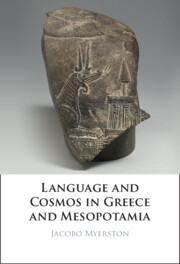Book contents
- Language and Cosmos in Greece and Mesopotamia
- Language and Cosmos in Greece and Mesopotamia
- Copyright page
- Dedication
- Contents
- Tables
- Acknowledgements
- Abbreviations
- Introduction
- 1 Babylonian Theories of Language
- 2 Language and Cosmos in the Epic of Creation
- 3 Hesiod, Language, and the Names of Ishtar
- 4 Orpheus’ Cosmic Names
- Conclusion
- Bibliography
- Index
3 - Hesiod, Language, and the Names of Ishtar
Published online by Cambridge University Press: 16 May 2023
- Language and Cosmos in Greece and Mesopotamia
- Language and Cosmos in Greece and Mesopotamia
- Copyright page
- Dedication
- Contents
- Tables
- Acknowledgements
- Abbreviations
- Introduction
- 1 Babylonian Theories of Language
- 2 Language and Cosmos in the Epic of Creation
- 3 Hesiod, Language, and the Names of Ishtar
- 4 Orpheus’ Cosmic Names
- Conclusion
- Bibliography
- Index
Summary
This chapter explores coincidences and divergences between Hesiod’s conception of language and those found in Akkadian literature. First, it provides a synopsis of Hesiod’s ideas about language and the interrelation of these ideas with the poet’s broader poetics. Then it discusses how Hesiodic conceptions of language are deeply intertwined with the interpretation of divine names. The chapter also investigates how Hesiod’s particular ways of interpreting theonyms is used to endorse hermeneutic practices anchored in an oral tradition. It explores the differences between the Theogony and its cuneiform counterparts, especially by comparing how wordplay and etymology are deployed in the analysis of divine names.
Keywords
- Type
- Chapter
- Information
- Language and Cosmos in Greece and Mesopotamia , pp. 76 - 106Publisher: Cambridge University PressPrint publication year: 2023

